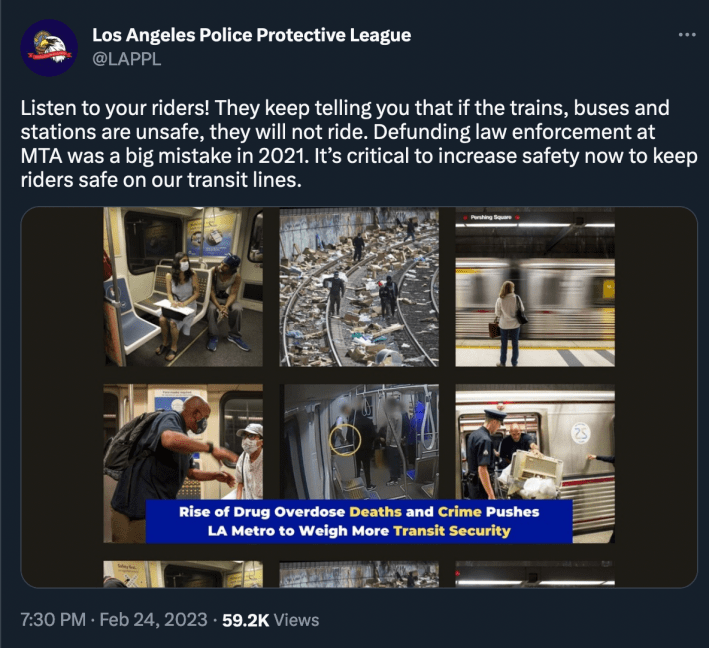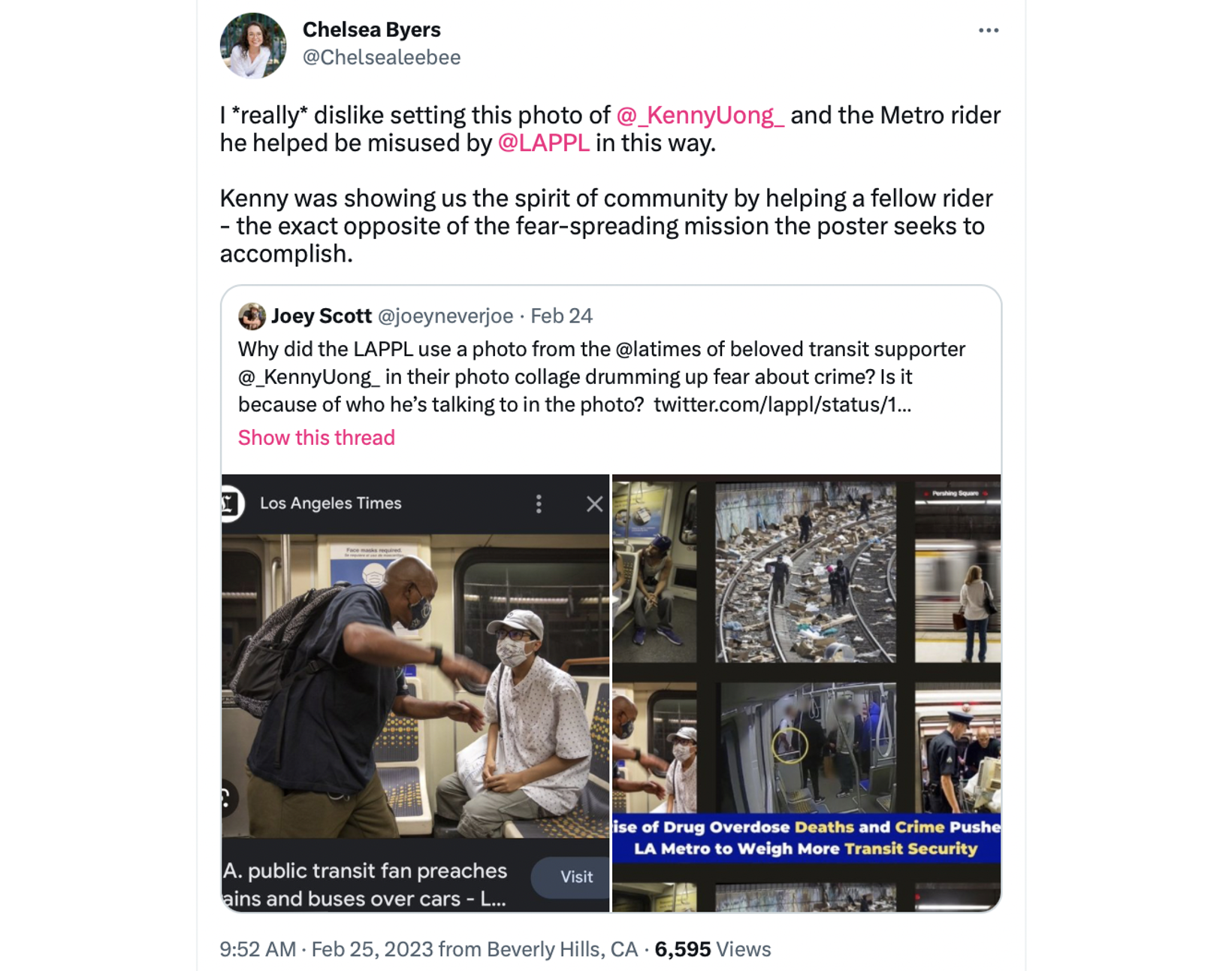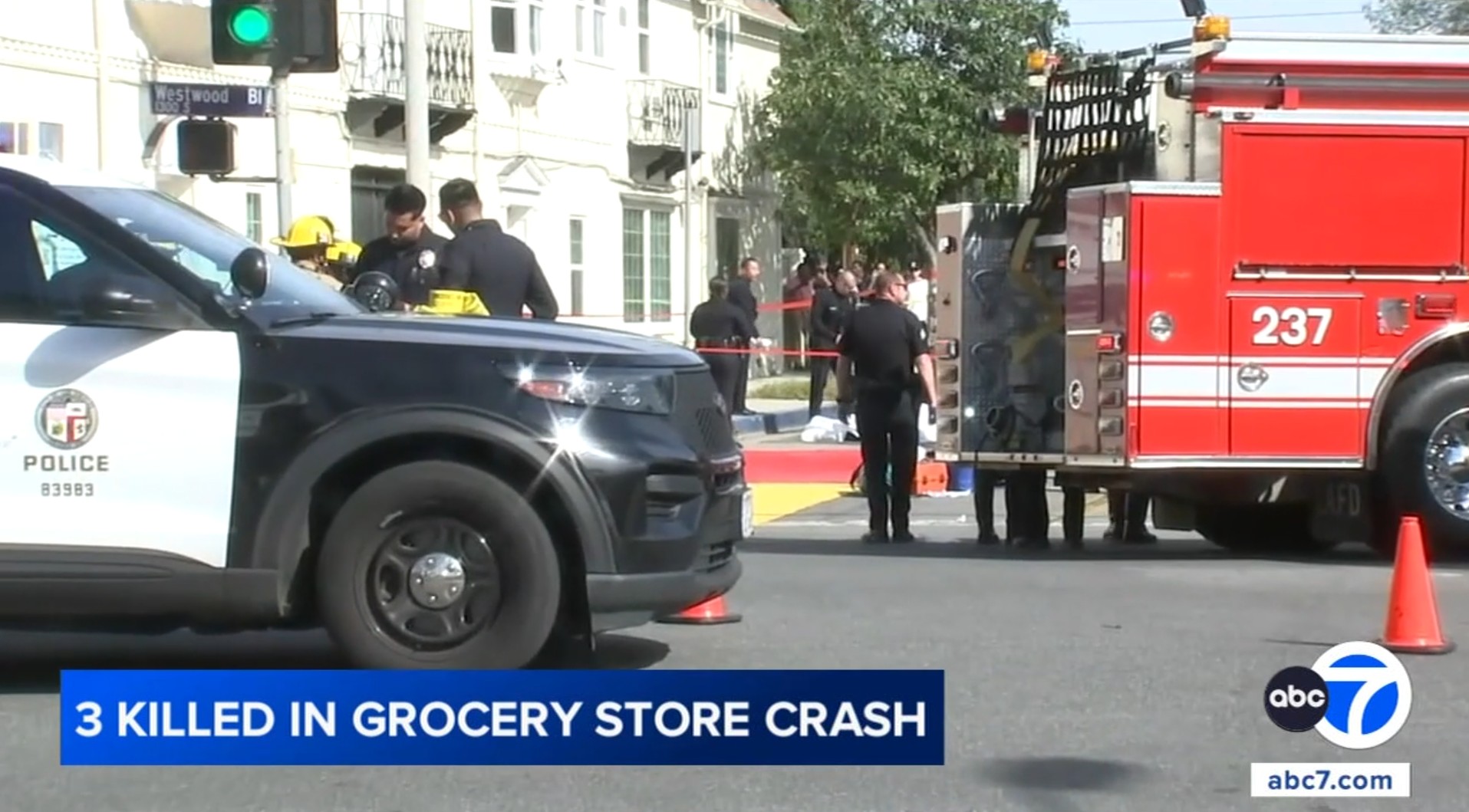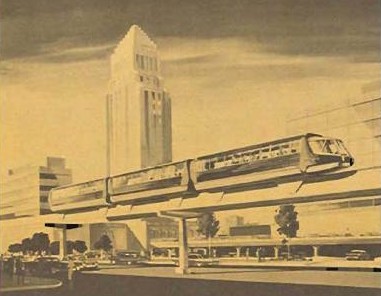In an effort to capitalize on an L.A. Times story about the rise in drug-related deaths on the Metro transit system, the Los Angeles Police Protective League (LAPPL) decided to tweet a racism.
The goal was to make the case that Metro, which embarked on a process of reimagining public safety in response to the killing of George Floyd by Minneapolis police in 2020, was hurting public safety by "defunding" LAPD.
"Listen to your riders!" the tweet proclaimed against a back drop of images meant to convey how vulnerable riders - young Asian men and lone young women, in particular, it appears - were to to being menaced by unhoused people and others who, by some strange coincidence, just happened to be Black. "They keep telling you that if the trains, buses and stations are unsafe they will not ride. Defunding law enforcement at MTA was a big mistake in 2021. It's critical to increase safety now to keep riders safe on our transit lines."

It did not work out well for them.
First, as noted by Streetsblog L.A.'s Sahra Sulaiman, not only had Metro not defunded LAPD, the opposite had occurred.
Narrator: Law enforcement was in fact *not* defunded on Metro in 2021; instead Metro extended the policing contract while also approving an additional ~$110mil to cover transit policing cost overruns. https://t.co/lM39UioeUQ
— sahra (@sahrasulaiman) February 25, 2023
Back in 2017, Metro had effectively re-funded the LAPD by abandoning their single-agency contract with the Sheriff's Department (LASD) and awarding a five-year multi-agency policing contract to LAPD, LASD, and the Long Beach Police Department (LBPD).
The contract split $130+million/year between the three law enforcement agencies. Yet they still came to Metro in early 2021, hat in hand, announcing they had overshot their budget by 17 percent and effectively threatening to walk off the job that summer if Metro didn’t cover the overruns.
Though discomfited by the request, the board approved an additional $36 million in March 2021 to cover costs that had already been incurred. At that same meeting, Metro also approved motions allocating funds to a pilot Transit Ambassador program and reaffirming its commitment to finding alternative approaches to public safety. But these were in addition to its commitments to law enforcement, not in place of. Then, at the end of 2021, the board both approved the outstanding $75 million for law enforcement and extended the multi-agency policing contract through the end of June 2023.
In other words, police had been plusfunded, not defunded, by an additional $110 million.
The extra law enforcement money was all the more confounding for having come at a time when Metro was cutting transit service. Metro policing funds, it should be noted, come from the same pot of money that pays for transit operations, meaning that those cost overruns contribute to the defunding of core transit service.
Unfortunately, LAPPL's false defunding claim was just the tip of the iceberg.
The tweet also featured a shot of package-strewn Union Pacific tracks, which are not Metro's purview.
And L.A.'s most beloved transit enthusiast, Kenny Uong, voiced his dismay at learning an image of himself engaging a tourist who needed help navigating the system was being used to suggest he was being crimed upon by a Black man.
Interesting how they used that pic from the 2021 LA Times article about me to depict rise of crime on transit… 🤔 In that pic, I was talking to a rider who had trouble navigating the LA Metro system! https://t.co/nZkmqAUMLv pic.twitter.com/jFt6h5tx7a
— Kenny Uong (@_KennyUong_) February 25, 2023
Angelenos quickly assembled to avenge the attack on Uong and the gentleman he was speaking to.
But there was still more to unpack. Asiyahola Sankara, the former Organizing and Outreach Program Manager for Alliance for Community Transit-Los Angeles (ACT-LA), called out the misrepresentation of Scarlett De León and Terue Williams in another image.
The L.A. Times had been following De León, the Campaigns Manager for ACT-LA and an advocate for alternatives to armed officers on transit, as she spoke with commuters about their experiences on transit and their perspectives on safety. As Metro continues to revisit what constitutes safety for all, it is essential to understand whether and how armed officers make Metro's core ridership - lower-income Black and brown riders - feel more or less welcome on the system. Transit users like Williams, who was shot in the legs by LAPD when he was just 22, have much to teach advocates and agencies about the needs of transit-dependent communities. But the LAPPL appears to have viewed the image as an opportunity to suggest young women are vulnerable to harassment, particularly by Black men.
Absolutely unhinged post for a lot of reasons including bc the guy in the top left photo is Terue Williams, who was shot by an LAPD officer and survived https://t.co/B7B668AGm3 pic.twitter.com/qjDW9u6XNK
— Asiyahola Sankara (@asiyahola_s) February 25, 2023
After being dragged every which way on twitter, LAPPL finally deleted the original tweet yesterday.
Then they inexplicably reposted it - including with the same images, though this time with the original source captions - and offered an apology for the "misunderstanding" in a companion tweet.
The adjusted tweet and the apology were then both deleted within an hour or two. No further comment has been offered.
Of course, there was no "misunderstanding." LAPPL's messaging is deliberate; they cater to an audience that views even the most milquetoast critiques of law enforcement as anti-police. And they have no qualms about distorting the truth to proclaim they are under siege. Just three weeks ago, they attacked L.A. City Councilmember Hugo Soto-Martinez, decrying him as an abolitionist hypocrite who called the police to have them protect "his" Lexus. When it emerged that Soto-Martinez did not own a Lexus and that, unbeknownst to the councilmember, staffer David Mai had called for protection for his own car, LAPPL was undeterred. They continued to claim Soto-Martinez had requested special patrols, this time in a tweet featuring video of Mai - not Soto-Martinez - driving away in the Lexus in question. LAPD has since opened a probe into the leak of the call for service to Fox 11 News.
WWLDD? What Would Larry David Do? We showed you the hypocrisy of Councilmember Hugo Martinez wanting to abolish the police—except to protect his ride. But what about the integrity of defending that action?
— Los Angeles Police Protective League (@LAPPL) February 7, 2023
Watch here: https://t.co/10qGqAsYYe#curbyourenthusiasm #curbyourmeme pic.twitter.com/jUscBfGizx
_________
As former councilmember Mike Bonin pointed out in a twitter thread criticizing the LAPPL's original tweet and their "half-assed" apology, the timing of their post(s) was "surely intentional."
With the next five-year police contract being up for renegotiation this March, and the approval of an additional $54 million for policing costs incurred last year going before city council on Wednesday, the LAPPL is seeking to stir up opposition to the public safety alternatives Metro has spent the last three years working out.
In government, everything is used to justify more police spending. Crime is down? Spend more on police to keep it that way. Crime is up? Spend more on police to stop it.
— Mike Bonin (@mikebonin) February 28, 2023
And if crime goes up even when police spending goes up? Lie about it and claim police were defunded.
Though the final contract will likely still include a hefty amount of police funding, Metro's "layered approach" to safety should also shift significant resources toward expanding the pilot Transit Ambassador program and investing in outreach and services supporting unhoused people, programs aimed at those experiencing mental health issues, transit station activations, elevator attendants, and more. Hopefully that approach will also include improved service. Better, more frequent, and more reliable service cuts down the amount of time people must spend waiting alone in off-peak hours while clean, well-lit, and well-maintained stations and stops can improve riders' comfort and safety, both real and perceived.
There is no question that the system's safety issues are pressing. In recent years - even under the current plusfunded law enforcement contract - crime has increased. And while the rise in overdose deaths may be reflective of distressing national trends, they are also reflective of a public health crisis that will not be solved by criminalizing those on the system who are struggling with substance abuse, other mental health issues, and/or a lack of a place to call home. As councilmember Soto-Martinez explains in a brief video message to constituents, the inability - and unsuitability - of police to resolve those public-health related issues is why a new set of comprehensive and prevention-oriented solutions is so urgently needed now.
On Wednesday, Council will vote on a 54 million dollar contract between LAPD and Metro, the same day we vote on giving just 1 million to create an office of unarmed response.
— Hugo Soto-Martínez (@HugoForCD13) February 28, 2023
I want to talk about how this is a bad deal for LA. https://t.co/dA7hw1psRD pic.twitter.com/pIdEo0y2l0
Metro's proposed care-based alternatives reflect an effort to address those deeper-rooted issues head-on, both to meet riders where they are and to lay the foundation for a healthier, safer, and more welcoming system for all going forward.
What remains is for Metro to tune out racist fearmongering and fully invest in this new path: commit to implementing alternatives, prioritizing better service, and taking bold bites of the police budget so that service can be enhanced and alternative programs are robust, fully resourced, and given a real chance to live up to their potential.
Metro's ridership deserves no less.
But most of all, they deserve for their safety to be in the hands of people who do not view them as the posterchildren for crime.
_______
If there is a silver lining to the LAPPL's terrible tweet, it is that it has brought new attention to a complex policy and budgetary process that can only benefit from greater public engagement. The next board meeting is scheduled for March 23 at 10 a.m. The safety/policing approach may be heard first at the March 16 Operations, Safety, and Customer Experience Committee meeting. Find agendas, get information on how to participate in the discussion, and tune in via the Metro board meetings page. Follow Streetsblog L.A. on Twitter for updates and live tweets from Metro board meetings.







